Emergency Syria

Photo credit: WFP/Abeer Etefa

Photo credit: WFP/Abeer Etefa
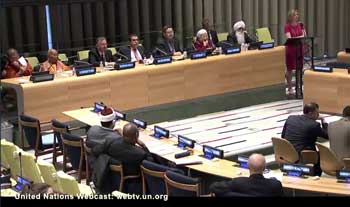
Video of High-Level Thematic Debate
What are the religions in today’s world? Many see them as obstacles to peace, the residue of ages past that today are the cause of violent extremism. What would the world really be more peaceful without the religions? The High-Level Thematic Debate on Promoting Tolerance and Reconciliation suddenly became animated. The second day of the UN meeting offered some directives. During the opening address, Secretary General Ban Ki-moon proposed an advisory committee formed by the leaders of the world’s religions, to help the United Nations find solutions to the current conflicts, often between the followers of different religions. The plenary session that followed included testimonies from 15 religious leaders. All present agreed that religions should help to build peace, moving beyond mere tolerance to mutual acceptance, with the awareness that there are already people around the world who are already living like this in their daily lives. In her talk, Maria Voce recalled the long experience lived by the Focolare Movement: “The encounter between religions and cultures is an ongoing and fruitful experience that is not limited to tolerance, mere recognition of differences, and it goes beyond reconciliation, although that is fundamental, and it creates what could be called a new broader and shared common identity.” And this takes place in contexts that have been struck by serious crises, such as in Algeria, Syria, Iraq, Lebanon, the Democratic Republic of the Congo, Nigeria and the Philippines. 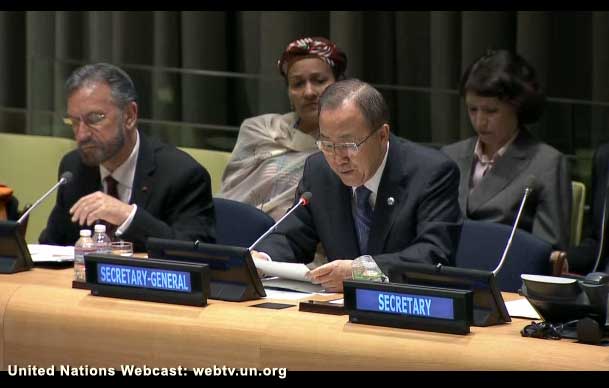 In response to the challenges and to the violence, she proposed an “extremism in dialogue,” that is, a dialogue requiring maximum engagement “that is risky, demanding, challenging, that aims at severing the roots of misunderstanding, fear and resentment.” Then she invited all to aim for a “a universal civilization that leads all peoples to consider themselves part of “civilization of alliance; a universal civilization which enables peoples to see themselves as part of a great happening, which is both varied and fascinating, that is humankind’s journey towards unity. She invited the UN to rethink its own calling, to reformulate its mission in order to be “an institution which truly works towards unity among nations, while respecting their strong identities.” According to Maria Voce, to say that religions are the cause of the tensions is to have a too restricted vision of the situation. What we are witnessing in many areas of the world, from the Middle East to Africa, has very little to do with religion, but has much to do with the structures marked by the culture war. From any point of view, in these cases we should not speak so much about wars of religion but more concretely, realistically and prosaically, about the religion of war. Everyone was in agreement: religions lead to peace, if not, they are instrumentalised for other ends. And so the vocation of religions is clearly stated: The Golden Rule, the foundational inspiration of all religions, which unites them, the idea of one universal human family.
In response to the challenges and to the violence, she proposed an “extremism in dialogue,” that is, a dialogue requiring maximum engagement “that is risky, demanding, challenging, that aims at severing the roots of misunderstanding, fear and resentment.” Then she invited all to aim for a “a universal civilization that leads all peoples to consider themselves part of “civilization of alliance; a universal civilization which enables peoples to see themselves as part of a great happening, which is both varied and fascinating, that is humankind’s journey towards unity. She invited the UN to rethink its own calling, to reformulate its mission in order to be “an institution which truly works towards unity among nations, while respecting their strong identities.” According to Maria Voce, to say that religions are the cause of the tensions is to have a too restricted vision of the situation. What we are witnessing in many areas of the world, from the Middle East to Africa, has very little to do with religion, but has much to do with the structures marked by the culture war. From any point of view, in these cases we should not speak so much about wars of religion but more concretely, realistically and prosaically, about the religion of war. Everyone was in agreement: religions lead to peace, if not, they are instrumentalised for other ends. And so the vocation of religions is clearly stated: The Golden Rule, the foundational inspiration of all religions, which unites them, the idea of one universal human family.  In the roundtable at the afternoon plenary, which was moderated by BBC’s, Laura Trevelyan, Rabbi David Rosen asked why so many young people feel drawn to extremism: “Perhaps because they are searching for their own identity, or for some meaning in life.” “You normally do not mention God at the United Nations,” Rabbi Arthur Schneier dared to remark: “How are we to deal with this problem – that the UN has to be neutral – when 5 of the 7 billion people on this earth belong to a religion?” For Bhai Sahib Mohinder Singh, Sikh from Birmingham: “God is omnipresent, in each one of us, therefore you cannot say that God is not here.” Maria Voce: “You speak of God when you speak of justice, sharing all the goods of the earth, sustainable development; you speak of God when you think of what we are preparing for the future generations. This is speaking of God. It is not necessary to speak of him in the abstract.” How can we preserve the integrity of interreligious dialogue? Are the religious leaders here renouncing something by coming here to the UN to talk about resolving conflicts? “I’m not renouncing anything,” affirmed Maria Voce. “I’ve come out of love, thinking about bringing my contribution of love to humanity. I’ve felt enriched by this possibility.” She concluded with a glance towards the new generations: “Returning home, what I will do will be to support the activities of the young and the very young, because I believe in their prophetic power.” Then she gave the floor to Ermanno Perotti, a young Italian had accompanied her on her visit to the United States. The twenty five year-old, with a Master’s Degree in Development Economics, used the occasion to present the l’Atlas of Universal Fraternity, a dossier of projects that promote universal fraternity in all corners of the world. Maria Voce added: “With the hope that one day even these ‘fragments of fraternity’ can be presented to the United Nations,” and that the United Nations will gather them. With this vision it becomes clear that religions have a great opportunity, but also a great task: to build peace and respond to the challenges with “extreme dialogue” rather than closing in on their own group. Susanne Janssen, New York
In the roundtable at the afternoon plenary, which was moderated by BBC’s, Laura Trevelyan, Rabbi David Rosen asked why so many young people feel drawn to extremism: “Perhaps because they are searching for their own identity, or for some meaning in life.” “You normally do not mention God at the United Nations,” Rabbi Arthur Schneier dared to remark: “How are we to deal with this problem – that the UN has to be neutral – when 5 of the 7 billion people on this earth belong to a religion?” For Bhai Sahib Mohinder Singh, Sikh from Birmingham: “God is omnipresent, in each one of us, therefore you cannot say that God is not here.” Maria Voce: “You speak of God when you speak of justice, sharing all the goods of the earth, sustainable development; you speak of God when you think of what we are preparing for the future generations. This is speaking of God. It is not necessary to speak of him in the abstract.” How can we preserve the integrity of interreligious dialogue? Are the religious leaders here renouncing something by coming here to the UN to talk about resolving conflicts? “I’m not renouncing anything,” affirmed Maria Voce. “I’ve come out of love, thinking about bringing my contribution of love to humanity. I’ve felt enriched by this possibility.” She concluded with a glance towards the new generations: “Returning home, what I will do will be to support the activities of the young and the very young, because I believe in their prophetic power.” Then she gave the floor to Ermanno Perotti, a young Italian had accompanied her on her visit to the United States. The twenty five year-old, with a Master’s Degree in Development Economics, used the occasion to present the l’Atlas of Universal Fraternity, a dossier of projects that promote universal fraternity in all corners of the world. Maria Voce added: “With the hope that one day even these ‘fragments of fraternity’ can be presented to the United Nations,” and that the United Nations will gather them. With this vision it becomes clear that religions have a great opportunity, but also a great task: to build peace and respond to the challenges with “extreme dialogue” rather than closing in on their own group. Susanne Janssen, New York
Video of Round Table Debate: http://webtv.un.org/high-level-thematic-debate Press Release Press Area
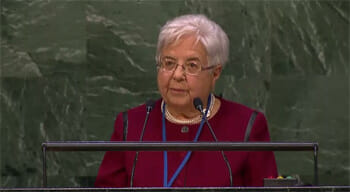

To risk your own life so as to relieve the suffering of the poor. This was Maria Voce’s invitation as she spoke of the last terrible phase of the Second World War, when in 1943 “a group of young women got together in the small city of Trent in northern Italy. While their city was being bombed, those young people, who were guided by a young teacher named Chiara Lubich, and urged on by a new understanding of the radical nature of Gospel love, decided to risk their lives to relieve the suffering of the poor.”
A choice many people make today too, helping to regenerate the fabric of society: Maria Voce referred to the refugee camps in Lebanon, Syria, Jordan and Iraq; the slums surrounding some huge cities and the united strength of those who “introduce into the destructive cycle of conflict a commitment to regenerate the fabric of society, by doing – according to the vocabulary of this organization would say – peace-building action”. She affirmed: “Those young women decided to break the vicious circle of violence by responding with attitudes and actions which in the atmosphere of conflict might have seemed unrealistic or even irrelevant. However, they were not and they are not!”
“Today too we are experiencing very serious political, institutional, economic and social breakdown, which requires equally deep-seated responses, able to change the prevailing paradigm. It seems that conflict and violence prevail in many parts of the world, affecting innocent people, guilty only of being in disputed territory, or belonging to a particular ethnicity or adhering to a specific religion.”
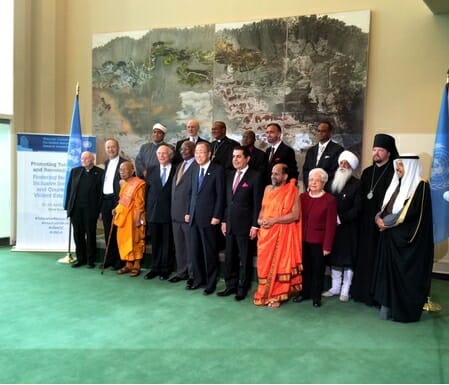 The encounter between cultures forms a new identity: “In the Focolare Movement, which I have the honour to represent – Maria Voce said – the encounter between cultures and religions (Christianity, Islam, Judaism, Buddhism, Hinduism and Traditional Religions) is an ongoing and fruitful experience not confined to tolerance or the mere recognition of diversity. It goes beyond reconciliation, essential as that is, to create, so to speak, a new identity, one that is broader, more general and shared. It is an effective dialogue which brings together people of very different beliefs, including non-religious beliefs. It spurs us to see what the real needs are and to respond together to the most difficult challenges in society, culture, economics and politics, as our commitment to a more united and socially inclusive world. This is happening in places which have been or are at present characterized by very serious crises, such as Algeria, Syria, Iraq, Lebanon, the Democratic Republic of Congo, Nigeria and the Philippines.”
The encounter between cultures forms a new identity: “In the Focolare Movement, which I have the honour to represent – Maria Voce said – the encounter between cultures and religions (Christianity, Islam, Judaism, Buddhism, Hinduism and Traditional Religions) is an ongoing and fruitful experience not confined to tolerance or the mere recognition of diversity. It goes beyond reconciliation, essential as that is, to create, so to speak, a new identity, one that is broader, more general and shared. It is an effective dialogue which brings together people of very different beliefs, including non-religious beliefs. It spurs us to see what the real needs are and to respond together to the most difficult challenges in society, culture, economics and politics, as our commitment to a more united and socially inclusive world. This is happening in places which have been or are at present characterized by very serious crises, such as Algeria, Syria, Iraq, Lebanon, the Democratic Republic of Congo, Nigeria and the Philippines.”
The Focolare President dispensed with half measures. “If violent extremism exists – she stated – (…) our response must be similarly radical, but one that is structurally different, by which I mean “extremism in dialogue”! A dialogue which requires the highest level of engagement, which is risky, demanding, challenging and which aims to sever the roots of incomprehension, fear and bitterness.”
The civilisation of alliance: referring to the United Nations “Alliance of Civilizations”, one of the promotors of this event, Maria Voce asked “whether, nowadays, we could get closer to the roots of this new outlook and focus not only on an alliance of civilizations but on what might be called the “civilization of alliance”; a universal civilization which enables peoples to see themselves as part of a great happening, which is both varied and fascinating, that is humankind’s journey towards unity. A civilization which makes dialogue the pathway to recognizing each other as brothers and sisters, as free and equal.”
Among the many organisations represented at the debate, she mentioned New Humanity, the NGO which represents the Focolare Movement at the UN; and regarding the United Nations Organization itself she posed the question:
“Shouldn’t the United Nations Organization perhaps reconsider its own vocation, and reformulate its own fundamental mission? What does being a “United Nations” organization mean today, if not an institution which truly works towards unity among nations, while respecting their strong identities? It is certainly essential to actively maintain international security but, although security is vital, it is not necessarily the same thing as peace.
Conflicts within nations and international conflicts; the deep divisions we are aware of at world level, together with the great local and global injustices, in fact require a true conversion in the actions and choices made in the field of global governance, to put into practice the motto formulated by Chiara Lubich, and launched in this very place in 1997, “love your neighbor’s country as your own” so as to build up universal fraternity.
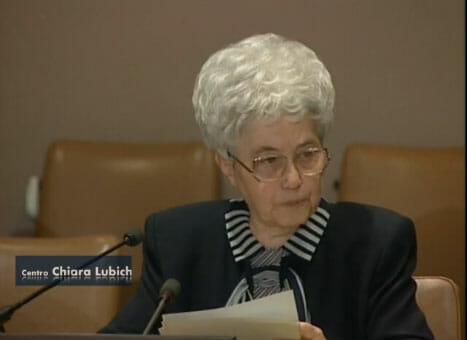
Chiara Lubich: “Toward a Unity of Nations and a Unity of Peoples” – United Nations Headquarters (New York), 28 May 1997
War is irreligion: “Lastly, we cannot give ground to those who attempt to describe current conflicts as “wars of religion” – Maria Voce went on. “War is by definition irreligion. Militarism, economic dominance and intolerance at all levels are causes of conflict, together with many other social and cultural factors among which religion is often only an unfortunate pretext. What we are witnessing in many areas of the world, from the Middle East to Africa, including the tragic deaths of hundreds of people fleeing wars who are shipwrecked in the Mediterranean, has very little to do with religion. From any point of view, in these cases we should not speak so much about wars of religion but more concretely, realistically and prosaically, about the religion of war.
What can be done? Quoting Chiara Lubich, Maria Voce invited the audience to have the courage to “invent peace”. “There are many signs that a new awareness may finally emerge, out of this serious international situation, of the need to work together for the common good, (…) and with the courage to ‘invent peace’. The time for ‘holy wars’ is over. War is never holy, it never has been. God does not want it. Only peace is truly holy because God himself is peace.”
She ended with reference to the Golden Rule which reflects the foundational inspiration of religions and unites them, so that they should “not [be] a tool used by other powers, even for the noblest aims; or precepts studied so as to resolve conflicts or crises, but rather a spiritual process which can be lived and becomes a community able to share and give meaning to the joys and sufferings of people today, channelling everything towards the realization of one universal human family.”
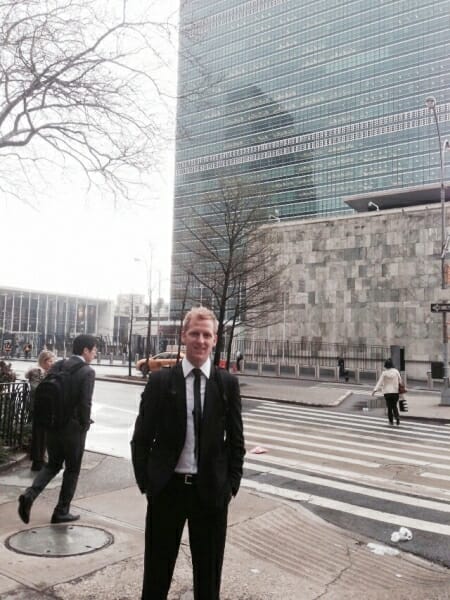
 The UN headquarters with the thousands of people who work there, heads of state and other VIPs, going there would be a dream for many people. Ermanno Perotti, a 25-year-old student of economics and development is there now, but not as one of the many visitors who wander along the endless corridors with their guide. He was asked to accompany Maria Voce, President of the Focolare Movement who had been invited, as one of the religious leaders to speak during the High Level Debate on “Promoting Tolerance and Reconciliation: Fostering peaceful, Inclusive Societies and Countering Violent Extremism.”
The UN headquarters with the thousands of people who work there, heads of state and other VIPs, going there would be a dream for many people. Ermanno Perotti, a 25-year-old student of economics and development is there now, but not as one of the many visitors who wander along the endless corridors with their guide. He was asked to accompany Maria Voce, President of the Focolare Movement who had been invited, as one of the religious leaders to speak during the High Level Debate on “Promoting Tolerance and Reconciliation: Fostering peaceful, Inclusive Societies and Countering Violent Extremism.”
The impression of Perotti is shared by many: the representative of each nation gives his or her contribution, many beautiful words and positive initiatives – but they seem almost isolated and each one appears to see this meeting as a platform to promote their own ideas. But what I find a bit hard to digest is that they don’t really listen to one another. But what does attract me is to see their efforts to fill this emptiness with true listening and dialogue. With this vision that he learnt from the life of the young people of the Focolare, he understood the attraction of taking on a commitment in politics so as to bring about truer relationships.
However, on the subject of how to prevent violence and fanaticism, almost all the speakers were in agreement, that there is no other way but dialogue among cultures. “I would love to run a school on dialogue right here at the UN” says Perotti. In fact 90% of the speakers emphasised the need for education and many spoke of the need to give women a voice and to fight against poverty.
Many spoke of the hope they have in young people and we have to start there. Perotti wasn’t completely happy: “It’s always adults who speak about young people, where are the young people who speak about the young people?” He thinks his generation is already prepared for a multicultural future: “I grew up with this idea. In my class there are people of 10 different nationalities and 4 religions. We can show the world how we live in a spontaneous way in our daily lives.”
Today is the high point for him, to be part of a panel at the UN. Ermanno Perotti is not worried at all: “Speaking with Maria Voce we were saying that we wanted to live these days first of all as an experience of God. Today too at the UN will be an experience of God. As some of the speakers said today. In the end everything is summed up in the Golden Rule which means love of neighbor. So going there with the President, it’s simple because you go to love, to be one body with all the young people in the world”.
Susanne Janssen, New York
Live streaming at http://webtv.un.org/live/

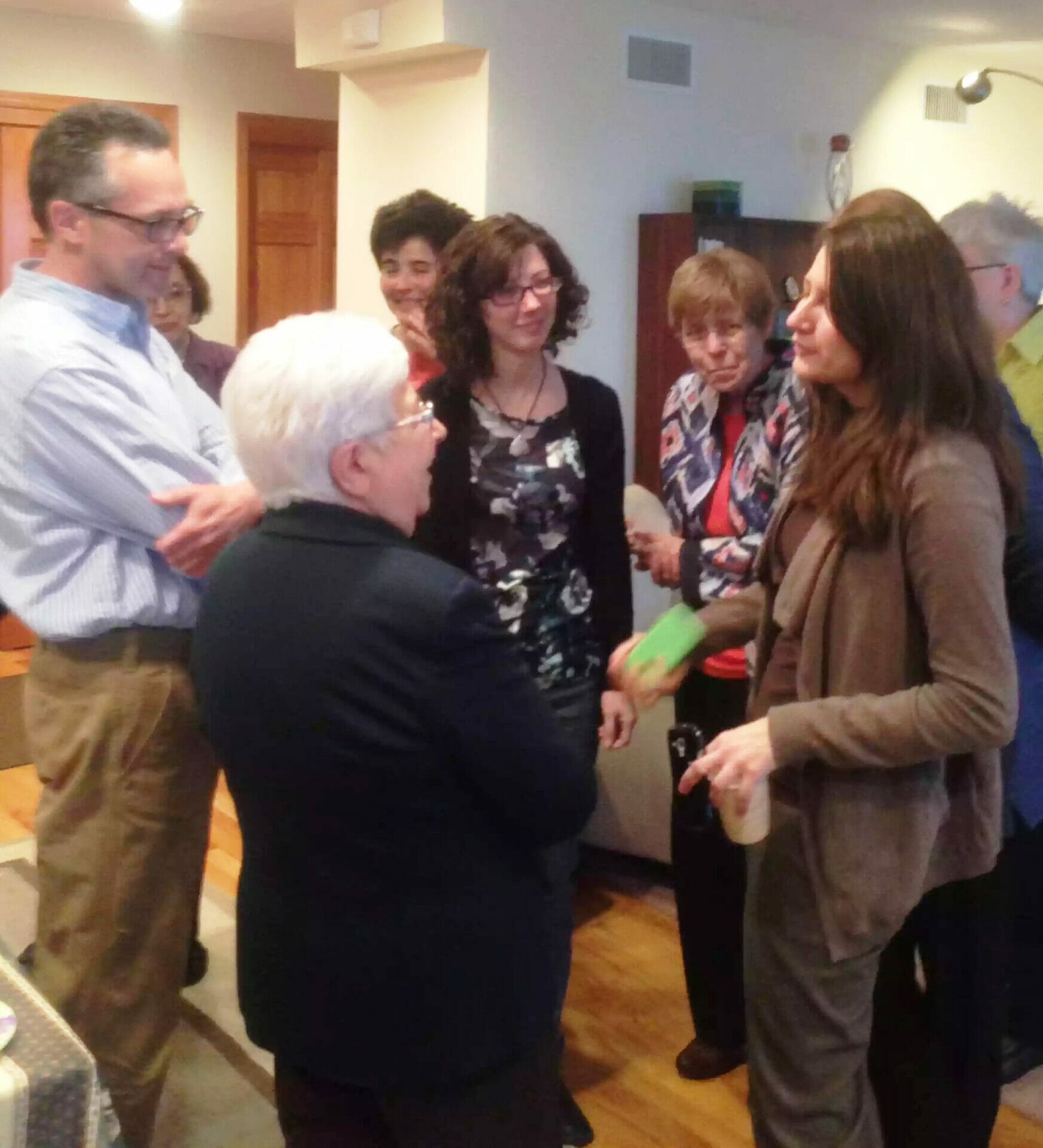 Today marks the beginning of the debate of the United Nations: “Promoting Tolerance and Reconciliation: Fostering peaceful, Inclusive Societies and Countering Violent Extremism”. Among the religious leaders invited to give their contribution is Maria Voce, President of the Focolare Movement. We asked her three questions before she entered the headquarters of the UN.
Today marks the beginning of the debate of the United Nations: “Promoting Tolerance and Reconciliation: Fostering peaceful, Inclusive Societies and Countering Violent Extremism”. Among the religious leaders invited to give their contribution is Maria Voce, President of the Focolare Movement. We asked her three questions before she entered the headquarters of the UN.
How do you feel before participating in this high level debate with representatives of 193 nations?
«I am quite at peace. What is often missing in these organizations is precisely the witness of what is already happening to bring about peace. My impression is that people often feel isolated and they need to be aware that someone else is out there with them, working for the same aims as they are. With such a great ideal as the one Chiara Lubich has given us, we do not work only for reconciliation or only for social justice but these are steps on the way towards unity».
If we look at the world today some might think that religions are the bearers more of division than of peace…
«Certainly religions are not supporters of war, none of them. The word religion means bond, it’s a bond between people, how can a religion make war? War is born in the hearts of people and people, whatever religion they belong to can be good or wicked. Instead religion is often exploited under the pretext of justifying a motivation that is anything but religious and is in fact inhuman, the desire for power, overthrowing the weak, selling one’s own merchandise including arms. The root of war certainly doesn’t lie in religion but in other motivations which are basically always egoistic».
When we look at today’s conflicts, for example in the Middle East or in Nigeria, are you still optimistic that peace is possible?
«I cannot help being an optimist because Jesus is peace. And since we follow Jesus we have to believe that peace is possible. It is true that Jesus said ‘I have come to bring the sword’ which means we have to take a stand too. I think that religions can help to reawaken the conscience of humanity: peace isn’t just one good among many but without peace all the other goods are useless. We can work for peace if we do it all together, both the rich and the poor, those who have power and those who do not, people who are religious as well as those who do not identify themselves with any religion. We have to commit ourselves to building these relationships of peace in the whole human family where we are all equal and therefore we should all witness to this equality».
The initiative for this high level debate at the United Nations in New York came from the President of the General Assembly, Sam Kutesa, the Secretary General Ban Ki Moon and the High Representative of the Alliance of Civilizations Nassir Abdulaziz Al-Nasser. Today’s topic is Strategies for fostering inclusive societies. Tomorrow, leaders representing various religions will be invited to give their witness to the role played by religions in building bridges of tolerance and reconciliation.
Susanne Janssen, New York
You can follow parts of the program on live streaming of the United Nations’s TV at http://webtv.un.org/live/
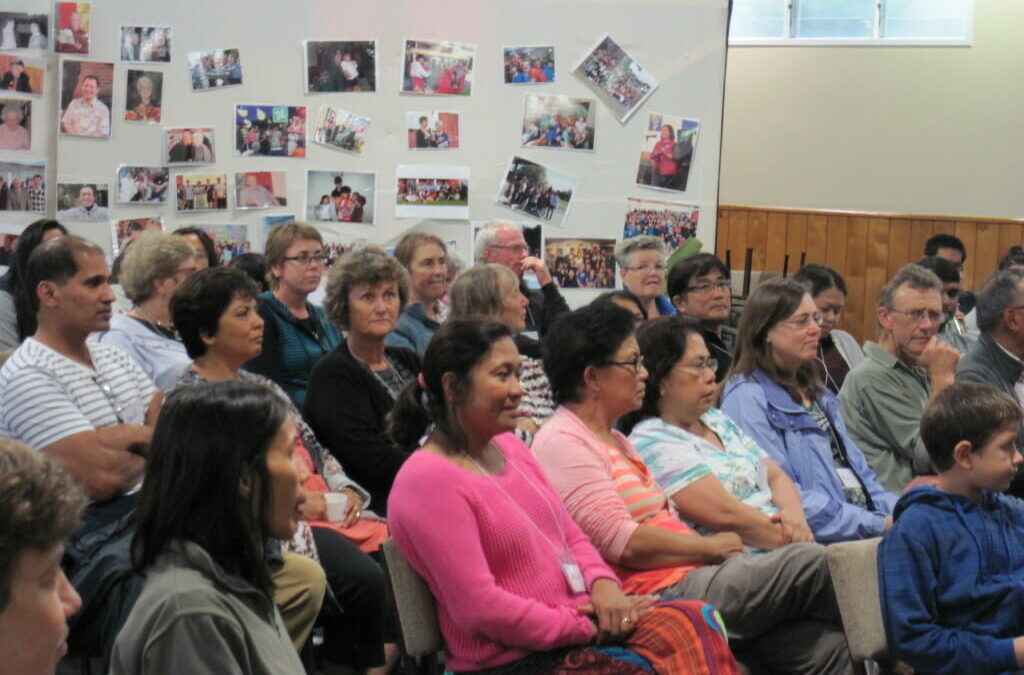
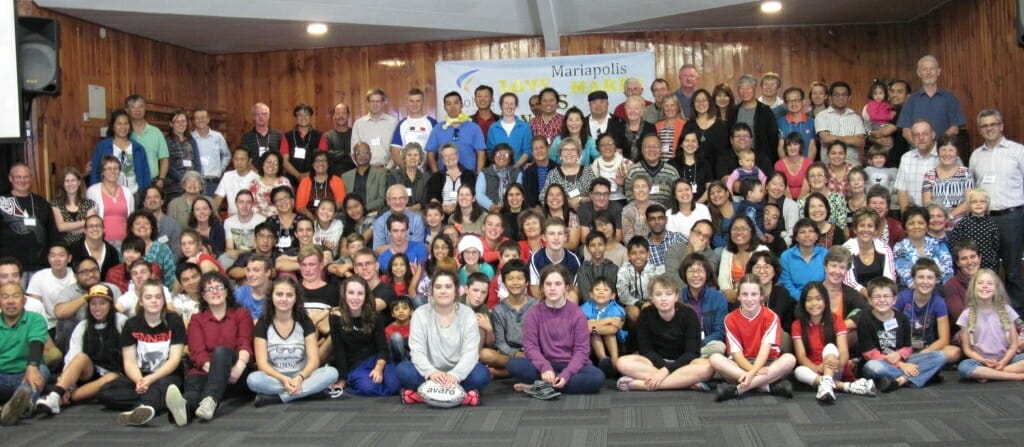 In the district of Rotorua (New Zealand) the earth’s crust is only 4 km thick. Here, one can admire the magnificent spouts of geysers right in the heart of the city, steamy puddles with bubbles gushing out of the surface. The ground emits a heat that even reaches 120°C. This is where the English colonisers had tried to install Roman baths. Still today thermal activity is at the centre of the touristic prospects of Rotorua, a city immersed in the greens and surrounded by hills. On the banks of the lake with the same name, rises the Keswick Christian Camp, a summer facility. This is the where, the Focolare scheduled to meet, about 156 people from the various cities of New Zealand’s two main islands. The objective was to spend three days together, away from the daily routing, to go deeper into the spirituality of unity.
In the district of Rotorua (New Zealand) the earth’s crust is only 4 km thick. Here, one can admire the magnificent spouts of geysers right in the heart of the city, steamy puddles with bubbles gushing out of the surface. The ground emits a heat that even reaches 120°C. This is where the English colonisers had tried to install Roman baths. Still today thermal activity is at the centre of the touristic prospects of Rotorua, a city immersed in the greens and surrounded by hills. On the banks of the lake with the same name, rises the Keswick Christian Camp, a summer facility. This is the where, the Focolare scheduled to meet, about 156 people from the various cities of New Zealand’s two main islands. The objective was to spend three days together, away from the daily routing, to go deeper into the spirituality of unity. 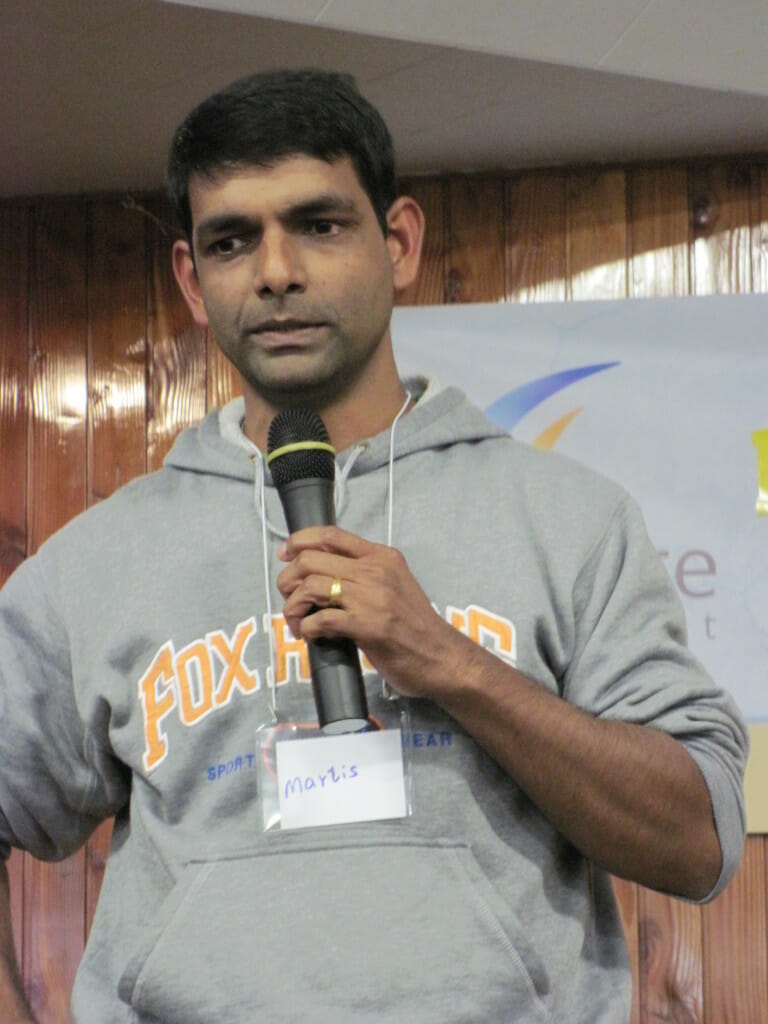 Maori, Filipinos, Chinese, Koreans, Dutch, Anglo-Saxons, Italians, Maltese, Singaporeans, Taiwanese, French, Tokelauans, Indians, Pakistanis…: an overwhelming variety of ethnic groups in a unique model of humanity. Despite such diversity, there was a family atmosphere from the start. Besides moments of spirituality and recreational activities, the programme dedicated a lot of time to getting to know one another and exchanging of experiences. The Pitcaithly family from Chistchurch, the country’s second city recounted a very moving experience of when the city was devastated by two big earthquakes. A tragedy that united the population in a sole slogan of solidarity “Kia kaha, stay strong Christchurch!” that also stood for the Focolare’s effort to gather funds offered by people from various parts of the world. The group from Gisborne, the city that has the privilege of being the first on this earth to see the sun rise, presented the “Fish & Chips Club” project. One its aims was to gather funds for the educational activities of young people, which has been fostered for many years now by people from the various Christian Church, together with others of non-religious beliefs. Together they were able to do something useful for others. Despite the multi-features of the youth and adults, they meet once a month to reflect on the Gospel and share experiences on how they try to put it into practice. A really significant way of growing as a persons and draw strength to bring ahead the various handicraft and sports activities of a club where everyone can be oneself and where people try not to stress the differences but the values all can share
Maori, Filipinos, Chinese, Koreans, Dutch, Anglo-Saxons, Italians, Maltese, Singaporeans, Taiwanese, French, Tokelauans, Indians, Pakistanis…: an overwhelming variety of ethnic groups in a unique model of humanity. Despite such diversity, there was a family atmosphere from the start. Besides moments of spirituality and recreational activities, the programme dedicated a lot of time to getting to know one another and exchanging of experiences. The Pitcaithly family from Chistchurch, the country’s second city recounted a very moving experience of when the city was devastated by two big earthquakes. A tragedy that united the population in a sole slogan of solidarity “Kia kaha, stay strong Christchurch!” that also stood for the Focolare’s effort to gather funds offered by people from various parts of the world. The group from Gisborne, the city that has the privilege of being the first on this earth to see the sun rise, presented the “Fish & Chips Club” project. One its aims was to gather funds for the educational activities of young people, which has been fostered for many years now by people from the various Christian Church, together with others of non-religious beliefs. Together they were able to do something useful for others. Despite the multi-features of the youth and adults, they meet once a month to reflect on the Gospel and share experiences on how they try to put it into practice. A really significant way of growing as a persons and draw strength to bring ahead the various handicraft and sports activities of a club where everyone can be oneself and where people try not to stress the differences but the values all can share 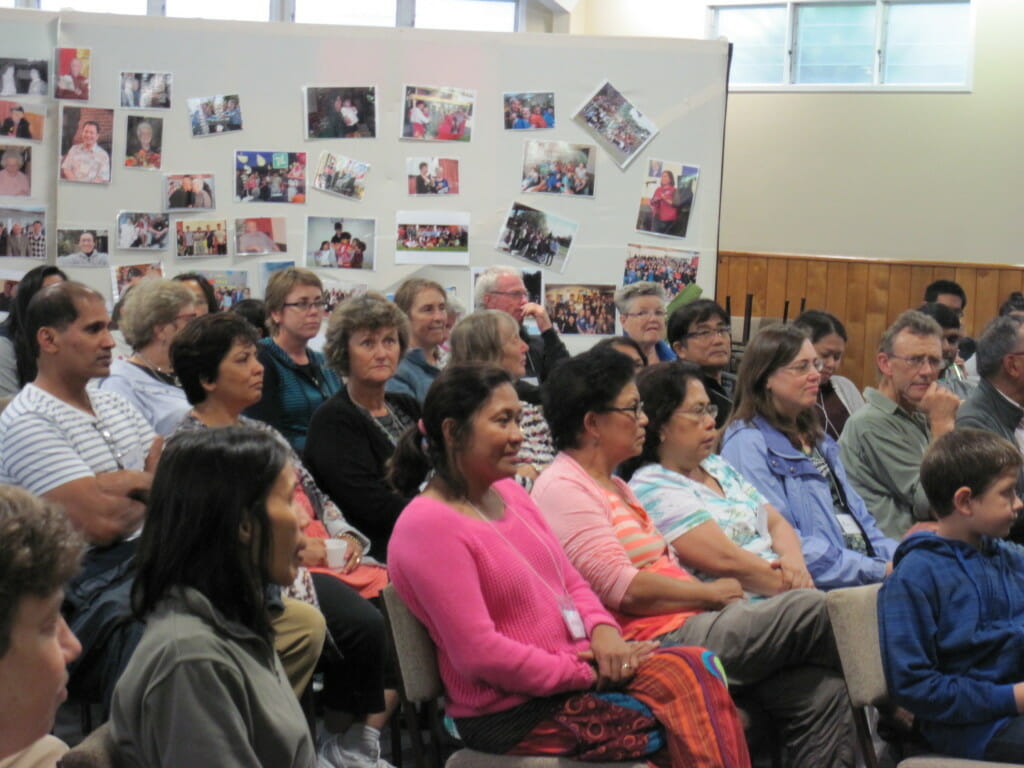 . Even if New Zealand seems to be a wealth land, an Indian-Pakistani family recounted their difficulties in integrating with society. Martis, father of two kids, was working in a home for the aged and his wife Antoneta in a small butchering company. All of a sudden they both lost their jobs. The quest for a new one went on without any results, so much so that they had decided to return to their homeland. Just ten days before the expiry of their visa, from a nearby town someone managed to arrange for a job interview for Martins who thus could renew his stay permit. It was an immense joy for this family that had given a strong testimonial of God’s love which manifests itself also through the community. Theresa, on summarising the wish of the youth present said: «What we experienced these days has given us a big boost to return to our respective cities and start all over again.» Anne, an elderly Maori lady, held in high esteem by her tribe, concluded: «Aroha te mea nui o te ao Katoa»; which in her language means: «Love is the biggest gift in the world.»
. Even if New Zealand seems to be a wealth land, an Indian-Pakistani family recounted their difficulties in integrating with society. Martis, father of two kids, was working in a home for the aged and his wife Antoneta in a small butchering company. All of a sudden they both lost their jobs. The quest for a new one went on without any results, so much so that they had decided to return to their homeland. Just ten days before the expiry of their visa, from a nearby town someone managed to arrange for a job interview for Martins who thus could renew his stay permit. It was an immense joy for this family that had given a strong testimonial of God’s love which manifests itself also through the community. Theresa, on summarising the wish of the youth present said: «What we experienced these days has given us a big boost to return to our respective cities and start all over again.» Anne, an elderly Maori lady, held in high esteem by her tribe, concluded: «Aroha te mea nui o te ao Katoa»; which in her language means: «Love is the biggest gift in the world.»